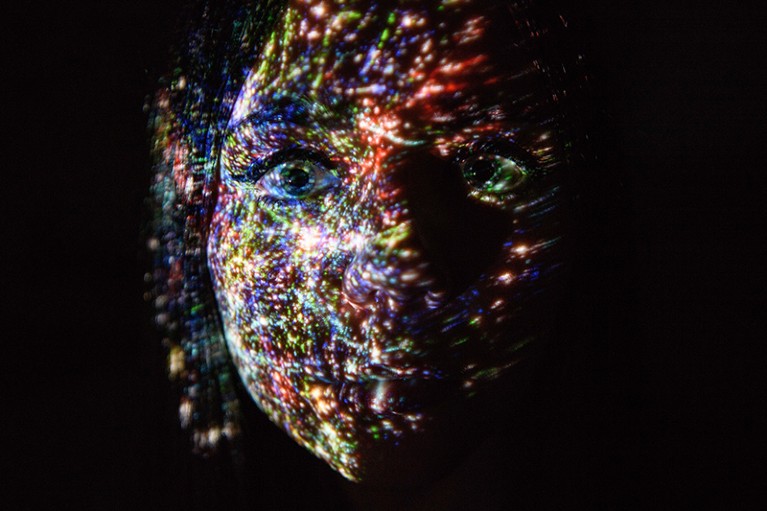
Digital lives could allow us to construct our own reality.Credit: Leon Neal/Getty
Fall; or, Dodge in Hell Neal Stephenson William Morrow (2019)
Neal Stephenson likes to blow things up. In Seveneves (2015), for instance, the prolific science-fiction writer detonated the Moon, then played out how humanity tried to save itself from extinction. In his new tome, Fall, the metaphorical explosion kills just one man. But this is an individual sitting on a few billion dollars, and longing to escape the shackles of mortality. The aftermath of the blast is thus just as powerful, and changes the fate of humanity just as profoundly.
The book’s billionaire protagonist is Richard ‘Dodge’ Forthrast, a tech-head in Seattle, Washington, who made his wealth creating an online multiplayer universe called T’Rain. T’Rain is played by millions — and in gamer geekdom, Dodge is a rock star. But he is a thoughtful guy with a complex past, much of it detailed in Stephenson’s 2011 novel REAMDE (see J. Gilbey Nature 478, 317; 2011).
Fall starts with Dodge preparing for an unnamed routine medical procedure. As the morning unspools, he notices a pair of books on Greek and Norse myths left behind by his grandniece, Sophia. At his favourite bakery, the owner presents him with a near-perfect apple. He collects a brilliant red maple leaf on his walk to the hospital. (These newly formed memories later take on greater significance.) At the hospital, he signs an autograph for a kid, who records it and posts it on the web.
That becomes the last record of the living Dodge. The procedure goes spectacularly awry, and he dies. Almost. His body is medically kept alive, because his will stipulates that his brain be preserved until technology is capable of regenerating it. This might not lead anywhere beyond a disembodied head on ice, joining the likes of psychologist James Bedford — were it not for the billions in Dodge’s bank account, managed by his executor and former employee Corvallis Kawasaki. (Corvallis, from the Latin for crow, denotes intelligence and inscrutability. Names map characters in Fall; Stephenson has a lot of balls in the air, so he gives you many digital tags to keep track of them.)
Fast forward 20 years, and Dodge’s billions have funded the technology to reboot him, although not in the way he envisioned: he is rebuilt, virtually. His brain is scanned atom by atom to create a ‘connectome’ — a wiring diagram for all his neurons — giving Stephenson the chance to geek out on neuroscience, focused ion beams and distributed quantum-computing technology.
Sophia, now an intern at a foundation created after Dodge’s death, launches the brain simulation. That, in turn, gives birth to a new digital universe that expands in ways no one could have predicted.
As its god, Dodge recreates himself out of the nothingness of the digital void before building a virtual cosmos (as a video-game designer, he knows the ropes). Others join him as they die and are scanned, leaving “Meatspace” (the world of the living) behind. There are twists and turns, and many mythic tales and conflicts are re-enacted.
Much of the focus remains on Meatspace and the challenges faced by those left behind to maintain and understand the workings of the digital heaven they’ve created. This is one of the most interesting aspects of Fall. Their tools for seeing into it are imperfect, monitoring the communication between the various sub-processes distributed across a network of computing platforms (yes, Heaven is in the Cloud). Ultimately, they become obsessed with Dodge’s constructed reality and it becomes a kind of Truman Show, where you can join the cast if you’re rich enough to be scanned and are willing to die.
Fall is a doorstop. At almost 900 pages, Stephenson takes his time in laying out the story. It’s a mash-up of fantasy and sci‑fi, with some flavour of J. R. R. Tolkien and William Gibson, and the author is not afraid to go off on tangents that don’t advance his tale.
Yet I got the impression that Stephenson, who has moonlighted for tech start-ups such as Blue Origin in Kent, Washington, and the Florida-based Magic Leap, doesn’t really care what we think. Writing is an act of exploration and creation, a journey to a new world. That someone will later read what was written is arguably irrelevant; the dead in Fall, after all, live out their second lives in the digital realm unconcerned about observers, having left that inferior world behind.
Like Dodge, Stephenson is creating a new universe from scratch, fighting battles and wrestling with big ideas. Those of us in Meatspace can only sit mutely by and watch the spectacle in wonder.

 After the cataclysm
After the cataclysm
 Q&A: The sci-fi optimist
Q&A: The sci-fi optimist
 Transgressive treats
Transgressive treats







